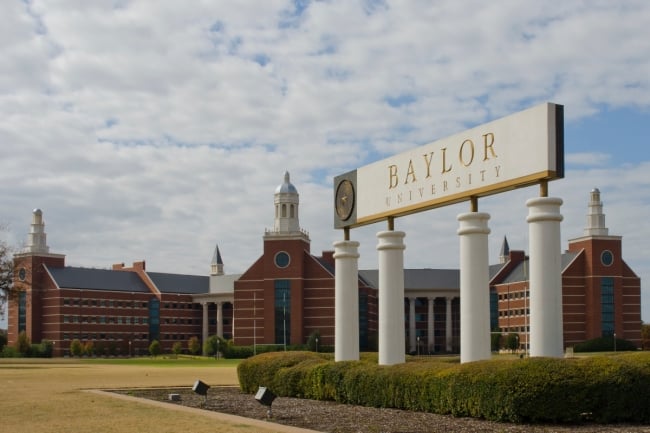You have /5 articles left.
Sign up for a free account or log in.

Baylor University said it conducted a thorough investigation of Pi Kappa Phi "while following our established policies and procedures."
iStock Editorial/Getty Images Plus
Baylor University announced sanctions against Pi Kappa Phi last week after an investigation found the fraternity guilty of hazing pledges via sleep deprivation.
But a Pi Kappa Phi pledge who reported the hazing to the university said he endured much more than just a lack of sleep.
The student, through his father, told Inside Higher Ed that he was forced to delete all social media from his phone and share his cellular location with other fraternity members. He was also asked to use his parents’ credit card to purchase items that would become the pledge’s “hazing bag,” including sardines, a brick, a blindfold, matches, five packets of Emergen-C and a water bottle.
The family requested anonymity for fear of reprisals.
During the hazing initiation process, the student said he was confined to a cramped room and denied sleep for 48 hours. He was required to eat multiple cans of sardines as quickly as possible and then do calisthenics. Pledges who vomited were forced to eat their own vomit, the student’s father said.
The hazing took place from Feb. 2 to 5, according to Baylor’s Student Conduct Administration report. The student reported the hazing to Baylor’s Interfraternity Council and the student affairs office on Feb. 3. The conduct administration began an investigation on Feb. 7.
The report concluded that Pi Kappa Phi was guilty of hazing pledges via sleep deprivation through late-night events, subjecting them “to an unreasonable risk of harm and/or adversely affected the physical health and/or safety of students.”
Baylor placed Pi Kappa Phi on disciplinary probation until May 31, 2023, and “social suspension“ until Dec. 31 this year, during which the fraternity cannot host on-campus events. But the report noted the fraternity can still participate in next fall’s homecoming float parade, intramural sports and “other activities that benefit the Baylor community or promote positive, internal chapter development.”
Dissatisfied with the outcome, the student and his family are now calling on Baylor to re-examine the incident and release a report that more accurately reflects what the student went through. They’re also urging Baylor to expel and hold individual fraternity members accountable under Texas’s antihazing law, which classifies hazing that causes serious bodily injury to another as a Class-A misdemeanor. Hazing that doesn't cause serious bodily injury to another is a Class-B misdemeanor and hazing that causes the death of another is a felony under the state's statute.
“This was mishandled from the start by Baylor,” the student’s father said. “What happened and what was described in the report was not sleep deprivation.”
Sharra Hynes, associate vice president and dean of students at Baylor, said via email that the university followed the law and university protocols in handling the situation.
“Hazing is never acceptable behavior at Baylor,” Hynes wrote. “The University conducted a thorough investigation while following our established policies and procedures. We are confident in our process and our compliance with state hazing laws.”
She noted that the process is designed to shield the identity of students who report misconduct by their peers or by student organizations.
“The university’s public reports are consistent in providing a general description of an incident to protect the confidentiality of an individual or individuals who reported or came forward with information about allegations of misconduct,” Hynes wrote. “It’s also important that we create an environment where reporting such information is encouraged, not discouraged, in an effort to protect the health and safety of students.”
In addition to the sanctions, the fraternity will face a membership review, during which alumni and members of the national organization will evaluate its pledging process. All members of Pi Kappa Phi will complete a specific hazing-prevention course assigned by the Department of Student Activities and funded by the chapter. Furthermore, two members are required to attend the national organization’s leadership conference, and six will attend the national organization’s conference for chapter officers.
“Having been in the fraternity and having gone to a leadership conference, I know that that’s just basically a good time,” the student’s father said. “So they’re essentially rewarding them with a vacation.”
Hynes said that Baylor’s process for determining an organization’s punishment for hazing is based “on the nature of the case at hand” and whether the organization has a history of hazing at Baylor.
During the membership-review process, each individual fraternity member will be evaluated by the national organization in conjunction with Baylor, Hynes said. The review will determine if a member is committed to the ideals of the fraternity and aligns with its mission; if the member isn’t, the member could be permanently removed from the national and campus organization.
Monica Ceja, assistant executive director of communications at Pi Kappa Phi National Headquarters, said the national fraternity is aware of the ongoing investigation.
“The national organization has placed the chapter on an interim suspension, and we are cooperating fully with the University’s investigation,” Ceja said in a statement.
According to both the student’s father, an attorney in Houston, and to his grandfather, a former chancellor of a state higher education system and president of a higher education association, the sanctions are merely a “slap on the wrist” for the fraternity.
“I thought it would be a no-brainer that they would at least be suspended from campus for a period of years and that both the national organization and Baylor would want that,” the student’s father said. “I mean, it seemed it was such a clear-cut case that it was a violation of the Texas antihazing statute.”
Stronger Action Against Hazing
The student’s grandfather shared with Inside Higher Ed a letter he sent to Baylor president Linda Livingstone, calling on her to take stronger action against hazing.
“I can assure you that I would have never stood for such atrocious student behavior and harassment at any of the universities I oversaw during my time as chancellor,” the grandfather wrote. “The fact that Baylor has responded in the manner it has leads me to believe that the culture of student harassment is still alive and well at Baylor even after the harassment that occurred a few years ago and that was reported nationally.”
After the student reported the hazing in February, a employee in student affairs encouraged him to drop out for the semester because Baylor couldn’t keep him safe, the grandfather wrote in his letter. The student faced physical and mental distress because of the hazing and the repercussions of reporting it, according to letter. The student’s father said his son withdrew this semester and is currently looking at transferring to another institution.
The student has faced threats on the anonymous social media app Yik Yak, with posts calling him “public enemy number one” for reporting the fraternity to Baylor. The father said the family sent the Yik Yak messages to the university.
Hynes said when the university receives verifiable information about threats, the perpetrator will be charged.
“While the nature of Yik Yak makes this kind of determination a challenge, we work with our law enforcement colleagues to investigate these allegations appropriately,” Hynes said via email.
Hank Nuwer, who maintains a website that tracks hazing incidents and deaths, said he’s not surprised by the incident at Baylor, given its long history of hazing. Hazing was so common back in the 1930s that Baylor president Pat Morris Neff strictly forbade it. But as recently as 2020, the university suspended 14 baseball players because of a hazing incident. Nuwer said sometimes hazing investigations don’t paint the full picture of how much pledges suffer because older fraternity members lie about what happened.
“If the school can get an admission of hazing, they sometimes stop and don’t keep going, because it is a difficult process,” Nuwer said. “And so sometimes they’re happy to just get that admission.”
When institutions don’t hold students accountable or address hazing on campus, it often makes individuals who report hazing lose trust in the university, which only injures the institution’s reputation, Nuwer said.
Nuwer noted that students who report their fraternity for hazing are often seen as pariahs and end up transferring institutions, just like the Baylor student who reported Pi Kappa Phi.
“Those students now have to live with a relative or rent a place at a new school and start all over again,” Nuwer said. “It’s intimidating enough for a freshman, who’s typically a pledge, to come to a school and then to have this terrible experience. It’s unconscionable.”
The student’s father said he’s not sure what he or his son want from Baylor but that the university had an opportunity to make the situation right, and it didn’t.
“Baylor needs to demonstrate a commitment to holding its students and its student organizations accountable,” the father said. “And I don’t think that their reactions to this event or their response to this incident—where you have a clearly documented case of hazing and their sanctions are very weak—accomplishes that goal. And I don’t think it sends a very strong message to Greek organizations or other organizations engaging in hazing.”




